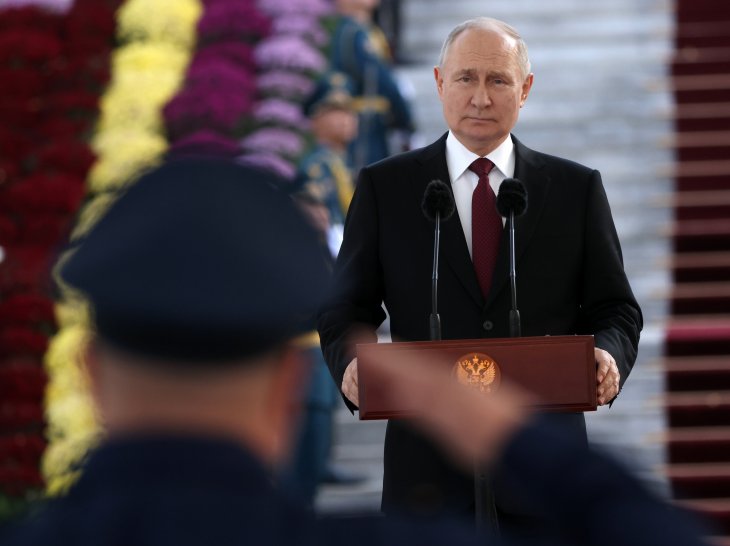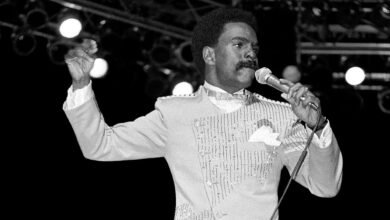
Only the Kremlin can take a decision that would end the war in such a way as to achieve a credible and long-lasting peace in Europe.
What does the world look like when viewed from Moscow?
This is the question asked by the president of Norges Forsvarsforening (the Norwegian Defence Association – NFF) Lieutenant General (Ret.) Arne Bård Dalhaug, who served as the Senior Manager for the OSCE Special Monitoring Mission to Ukraine from 2016 to 2019.

Vladimir Putin during a meeting with military personnel of Russian Air Forces Base on October 12, 2023, in Bishkek, Kyrgyzstan. Photo: Contributor / Getty Images
Russia’s war against Ukraine is an old-fashioned war of invasion. Russia’s goal is for Ukraine to cease to exist as a sovereign state; through the exercise of military force, the country must be conquered and governed from Moscow. The last person in Europe to put such ideas into practice was Adolf Hitler. There is absolutely nothing to suggest that Russia has plans to abandon this maximalist ambition, even though it has become obvious that achieving this goal is far beyond the short- or medium-term capabilities of the Russian military.
We must simply acknowledge the fact that even though the war has now been going on for around 19 months, no one can say how Russia’s self-destructive war will come to an end. Nor do the Russian and the Ukrainian leaders know the answer. Nonetheless, we do know that the war will create a new geopolitical landscape before it comes to an end, although the map is not yet drawn. Only the Kremlin can take a decision that would end the war in a way that would achieve a credible and long-lasting peace in Europe. Precisely for this reason, it is important to analyse exactly what Russia might accept in connection with a possible future peace agreement, and not least, what would have to happen to bring this about. This is a topic that receives far too little attention in the West.
What does the world look like as viewed from Moscow? Briefly, Russia must emerge from the war in a way that befits a ‘superpower’, i.e., the global order must be changed in Russia’s favour, and its imperialist project must be put back on track, i.e., much more of Ukraine must be conquered. This is also crucial in view of domestic Russian political considerations.
Ending wars is difficult – especially for Russia
Even if Russia did want to withdraw from Ukraine, such a withdrawal would in itself be an enormously complex operation. How quickly could it happen? Should materiel be left behind? If so, what and how much? Which axes could be used to move forces and what is the conflict situation? And we are talking about huge logistical stockpiles, including heavy ammunition.
Implementing a controlled withdrawal would take many months. It is easy to understand that this is not something that the Russian leadership, headed by Putin, would want to put into action. A withdrawal of this type would only happen if Russia had suffered such catastrophic losses on the battlefield that replacing either personnel or materiel appeared impossible. An alternative scenario would be for the Russian military to suffer a disciplinary collapse, with soldiers shooting their officers and simply setting off home, as happened during World War I. We are nowhere near that situation yet. Clues as to what might happen, from the Soviet withdrawal from Afghanistan after 10 years of war, for example, are terrifying. The history of war offers few examples of ‘orderly’ and ‘honourable’ withdrawals from areas where forces have lost a long and bloody war.
The situation as seen from Moscow is much worse than we are generally aware. Since March last year, Russia has suffered an overall setback on the ground. Of territory that was occupied in the first phase of the war, well over 50% has now been lost – we are talking about areas of land larger than Denmark, for example. Today, approximately 17 percent of Ukraine is illegally occupied, but this includes Crimea and areas in Donbas that had been attacked previously, in 2014. This means that over half of the area occupied by Russia today was already occupied before 24 February last year. The enormous losses suffered by Russia have resulted in little by way of new territorial gains. Moreover, Russia is nowhere near controlling the four oblasts – Luhansk, Donetsk, Zaporizhzhia and Kherson – that the Russian parliament voted to ‘annex’ just over a year ago. This creates an untenable situation from Moscow’s perspective.
As early as March 2022, Sergey Karaganov, one of the Kremlin’s most prominent advisors on foreign and security policy, said that ‘Russia cannot permit itself to lose [the war]. We need victory in one way or another’. Dmitri Trenin, another key member of Moscow’s security policy milieu, almost a year ago wrote some gloomy comments about the further progress of the war, and the situation has worsened since. Firstly, Trenin was clear that in the current situation, there was no compromise that Putin could enter into with the expectation that his regime could survive. Much more Ukrainian land would have to be occupied before Moscow could negotiate. His second point was that so long as the war continued pretty much along current lines, even though this was a catastrophe, Putin could hold onto power, i.e., Russia has no plans for negotiations.
The primary strategy of Russian regime is to ensure its own stability
In Russia, there is a constant increase in hate rhetoric against Ukraine and the West. Putin and others regularly make speeches in which Russia and the Russian people are presented as having a mission (to defend true Christian values against the weakness and decadence of the West – ‘Moscow, third Rome’). New history textbooks have been distributed to schools, and children are being targeted with propaganda glorifying war. The central message is that Ukraine has no right to exist as a sovereign state.
Russia’s strategy now is to absorb the Ukrainian summer campaign, surrender as little occupied territory as possible, and to continue the war indefinitely. All decisions taken by Putin have the primary objective of securing his regime’s survival. Currently, Russia has no option other than to continue the war because any alternative is much worse for Putin and his circle.
Domestic Russian politics will determine much of what is possible regarding compromises with Ukraine. Remember that purely ‘constitutionally’, four Ukrainian oblasts now belong to Russia. It is almost unthinkable that the Duma could revoke the annexation without fatally undermining the very foundations of the regime. A conclusion to the war on conditions not in accordance with Moscow’s longstanding war propaganda would be a high-stakes project. The country could be thrown into widespread crisis with a significant risk that the Russian Federation could disintegrate. Moreover, such a situation would obviously be life-threatening for the current regime.
In addition, foreign policy considerations and Russia’s role as a ‘superpower’, as well as Russia’s own self-image, shaped by a long tradition of distorted historiography and ‘memory policy’, present a challenging framework. The belief that Russia is ‘special’ and has a role to play globally is strongly embedded in large parts of the population. Entering into an agreement with Ukraine that fails to live up to this propaganda-fueled mindset would be very difficult. A humiliating defeat in Ukraine would also further reduce Russian influence both in ‘the near abroad’ and globally.
Obviously, such an outcome would also have a significant impact on relations with China. Moscow has absolutely no intention of ending up as an ‘afterthought’ in the Middle Kingdom’s foreign policy portfolio.
Briefly, we should also note that Putin’s status as a wanted war criminal, along with many others who have also been identified, further complicates the conclusion of a peace agreement. A demand for war reparations has also been raised. And there will be no peace agreement, unless Russia accepts some kind of arrangement that would allow Ukraine security guarantees. This is another thing that is almost unthinkable for the Kremlin.
Two proposals for compromises that have been mentioned
One proposal is that Ukraine should surrender the areas occupied by Russia and that the Kremlin should agree to Ukraine joining NATO. This proposal is completely unrealistic from Moscow’s perspective. Under this proposal, Russia would have to go along with over 80 percent of Ukraine disappearing into NATO. Given the analyses in this article, Russia’s agreement to such a result is almost unimaginable. Another proposal suggests the opposite solution, i.e. Ukraine gets back all its territory, but refrains from applying for NATO membership. This result is also almost unthinkable for Moscow. How would one explain such an outcome to Russia’s indoctrinated population? Some commentators say that Russian propaganda could succeed in this pedagogical exercise, i.e., the regime’s ‘spin doctors’ would be able to twist almost any outcome whatsoever to the regime’s advantage. However, many members of the Russian elite do not believe that this is possible. There is also nothing to suggest that Putin himself has any faith in such an ‘about-face’. It has taken decades for the regime to get its population’s mindset to where it is today. We must also not forget foreign policy and Russia’s ‘superpower’ ambitions. The implementation of either proposal would be interpreted as a clear Russian defeat by the outside world.
Many people comfort themselves by imagining that a post-Putin regime could be more amenable from a Western perspective. However, realistic considerations suggest that no matter who governs Russia, the challenging framework from the past and the geopolitical outlook from Moscow will be very similar to what exists today. ‘Just ending the war’ isn’t so easy from the Kremlin’s perspective either.
- Arne Bård Dalhaug: Lieutenant General (Ret.); president of Norges Forsvarsforening (the Norwegian Defence Association – NFF); senior advisor, the Norwegian Atlantic Committee; senior vice president of the Sports Board of the Norwegian Olympic and Paralympic Committee and Confederation of Sports (NIF). Dalhaug served as the Senior Manager for the OSCE Special Monitoring Mission to Ukraine (from 2016 to 2019.
This text was published originally in Norwegian by Altinget 26 September 2023. The author is a member of the Advisory Board for the PRIO project Russian Approaches to Peace Processes.
Translation from Norwegian: Fidotext
Source link







